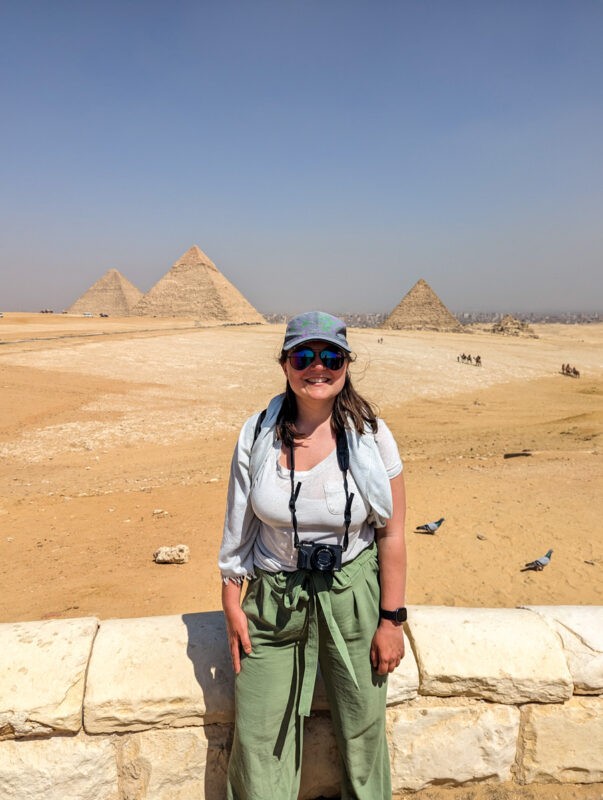Is Egypt worth visiting? Here’s my completely honest opinion, after visiting Egypt four times.
Ancient pyramids rising sharply up into the sky, city centres brimming with a cacophony of horns, Red Sea beaches and the River Nile splitting the country in two; Egypt’s long been known as a traveller’s paradise.
But while Egypt has a lot to offer tourists, it can be quite a hectic and overwhelming place to travel.
There can be quite a lot of hassle on the streets, paying “tourist tax” is common and Cairo in particular is very noisy and dusty.
While the huge majority of Egyptian men I met were respectful and kind, I did experience a couple of uncomfortable situations as a female traveller too.
So, here’s my full, honest thoughts about visiting Egypt.
Is Egypt worth visiting?
I do think Egypt is worth visiting to uncover the history, embrace the culture and eat some incredible food.
However, I think it’s important to understand some of the intricacies of the culture that you might be faced with when travelling here, and make an educated decision about whether it’s the right place for you to visit.
I would return to Egypt, but I probably wouldn’t go back to Cairo (apart from transit) and I don’t think I’d travel there on my own.
I’ve travelled around Central Asia and Mexico solo and even travelled from Bali to London without flying on my own, so this isn’t something I take lightly!
But let’s break it all down!
Reasons to visit Egypt
Egypt is not at all shy of tourist attractions, and of course, these are the main reasons to visit.
Diverse landscapes sprawl across the country, from the Mediterranean coastline to the Sahara Desert to the Nile Basin to the subtropical Red Sea.
Here are all of the best reasons to visit:
Pyramids and Ancient Egyptians
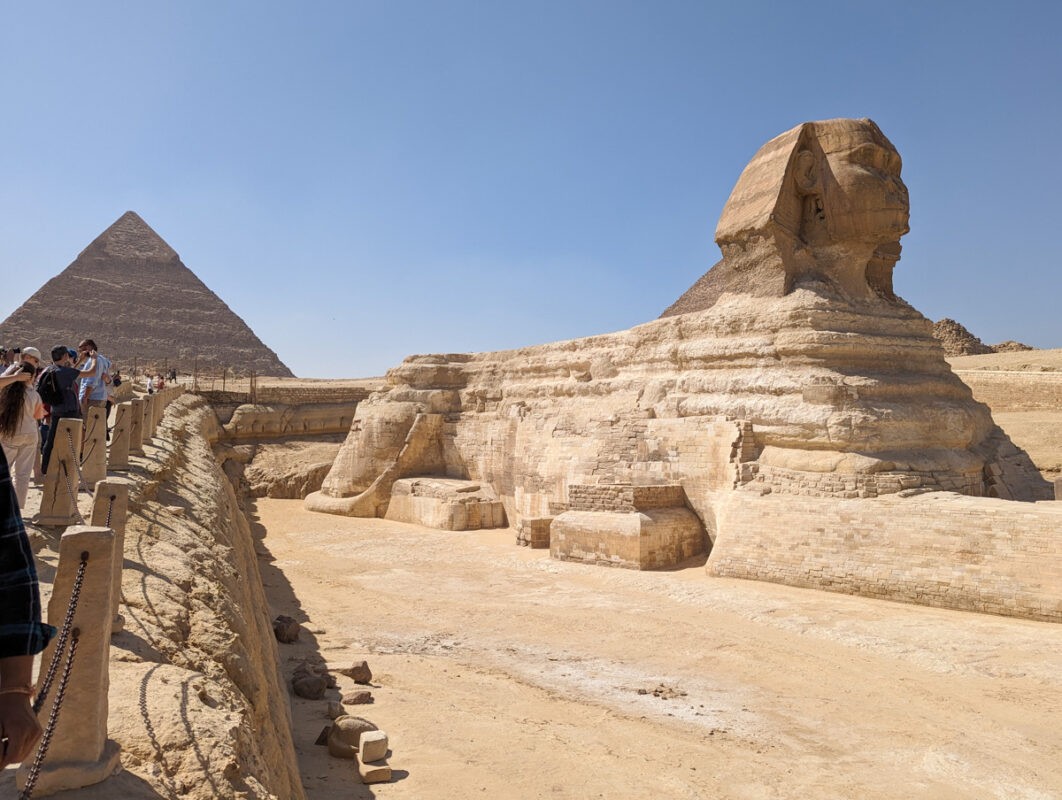
The ancient pyramids are the poster child of the North African country; and there’s no two ways about it, seeing them is completely mindblowing.
The Pyramids of Giza stand on the outskirts of Cairo, punctuating the sky with their rust-coloured peaks.
These pyramids date back 4,500 years and were the burial places of Ancient Egyptian kings (the Pharaohs).
I’d highly recommend seeing the pyramids on a tour; we did this private tour on Get Your Guide for $90 (split between the two of us).
It included transport to Saqqara, Memphis and Giza, along with a knowledgeable guide who explained the history.
Another huge benefit of having the guide meant that we didn’t need to worry about tips (more on this later!) for anyone in the pyramid complex – and anyone trying any scams stayed out of our way.
There’s also a new museum opening in Cairo (although this has been pushed back a few times!) which will detail many of the best facts you’ll need to know about this fascinating ancient civilization.
Extensive history
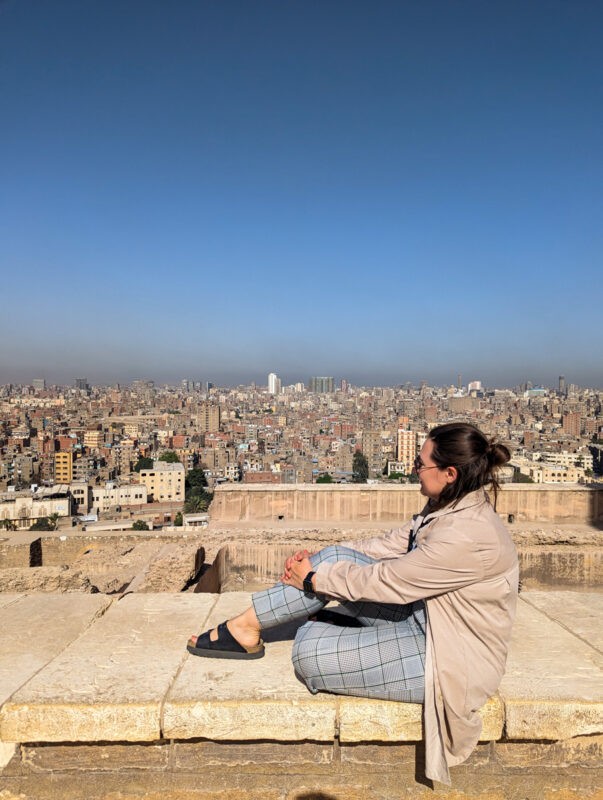
Other than the ancient Egyptians, there’s tonnes more history to sink your teeth into in Egypt too!
From the Citadel in Cairo to the lighthouse of Alexandria, Egypt’s been a cradle of civilization for centuries.
One of my top tips would be to do a tour of Coptic Cairo, visiting the city’s fascinating Christian churches and learning about this little-known part of Egyptian culture.
Coptic Christians are one of the oldest Christian communities, tracing their spiritual lineage back to Saint Mark in the 1st century AD in Egypt.
In Cairo, the Hanging Church and Saint Sergius and Bacchus Church offer glimpses into ancient worship spaces, and the Cave Church of Saint Simon is well worth the detour.
In Alexandria, don’t miss the Catacombs of Kom El Shoqafa which are a marvel of ancient engineering, blending Roman, Greek, and Egyptian styles in a subterranean necropolis.
Qaitbay Citadel stands as a fortress on the Mediterranean shore, constructed on the ruins of the ancient Lighthouse of Alexandria, one of the Seven Wonders of the Ancient World.
The Montaza Palace offers insight into a more modern era, showcasing the opulence of Egypt’s 20th-century monarchy.
Lastly, Pompey’s Pillar is a towering monument erected in honor of Emperor Diocletian.
It’s best to have a tour guide to help you make the most of this city – there’s so much history to take in!
Excellent SCUBA diving
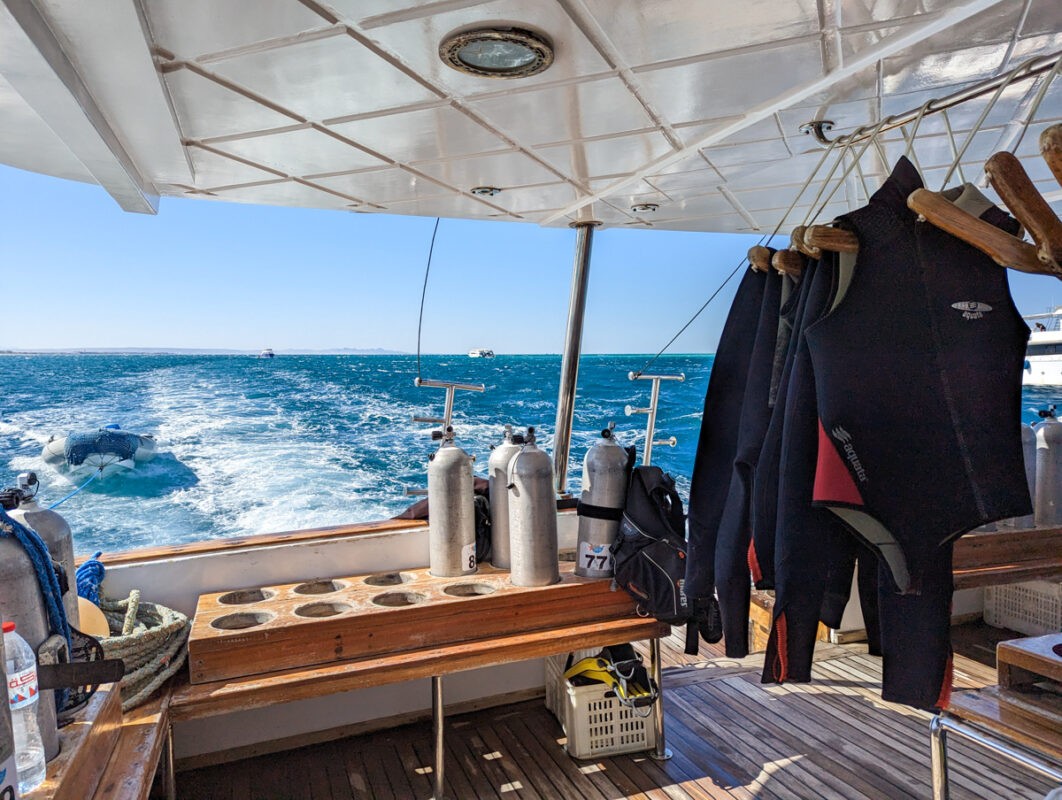
Egypt’s not just for history fans; there’s plenty of nature too!
And I think the best nature’s under the sea.
The Red Sea’s renowned for its biodiverse coral reefs. Thanks to the sea’s sheltered climate, it’s suffered less than others with climate change, meaning that the reef here is still thriving.
Around 25% of the Red Sea’s underwater flora and fauna are only found here!
We did a week of SCUBA diving with Diving Star in Hurghada, and they come highly recommended.
It’s also worth noting that Hurghada has a totally different vibe to the rest of Egypt; on our diving holiday, we didn’t experience any hassle and I would have been happy to visit on my own.
Whether you’re visiting the main dive sites off the coast of Hurghada or are taking a day trip from Sharm El Sheikh to visit the famous Thistlegorm ship – a ferry that sunk and is now regarded one of the best dive sites in the world – there’s plenty to tantalise beginner and experienced divers alike in Egypt!
Beautiful beaches
On a SCUBA holiday, you can also enjoy Egypt’s mesmerising Red Sea beaches.
These golden powdery sands line the coast of East Egypt, staying warm even in the cooler months.
The beaches, often comprised of soft white sand, provide a perfect backdrop for relaxing after a day in the water.
Most resorts in these areas offer full-service amenities, from diving centres to luxurious spas.
There are also Mediterranean beaches in the north of the country as well.
The Mediterranean coastline, most notably in Alexandria and Marsa Matruh, has a completely different character.
The waters are generally calmer and the beaches are often rockier.
Unlike the resort-centric Red Sea, the Mediterranean coast boasts urban beaches and isolated coves (generally, they’re a little more conservative). Here, you can experience Egypt’s Mediterranean culture, with local-feeling, less crowded beaches!
The Sahara Desert
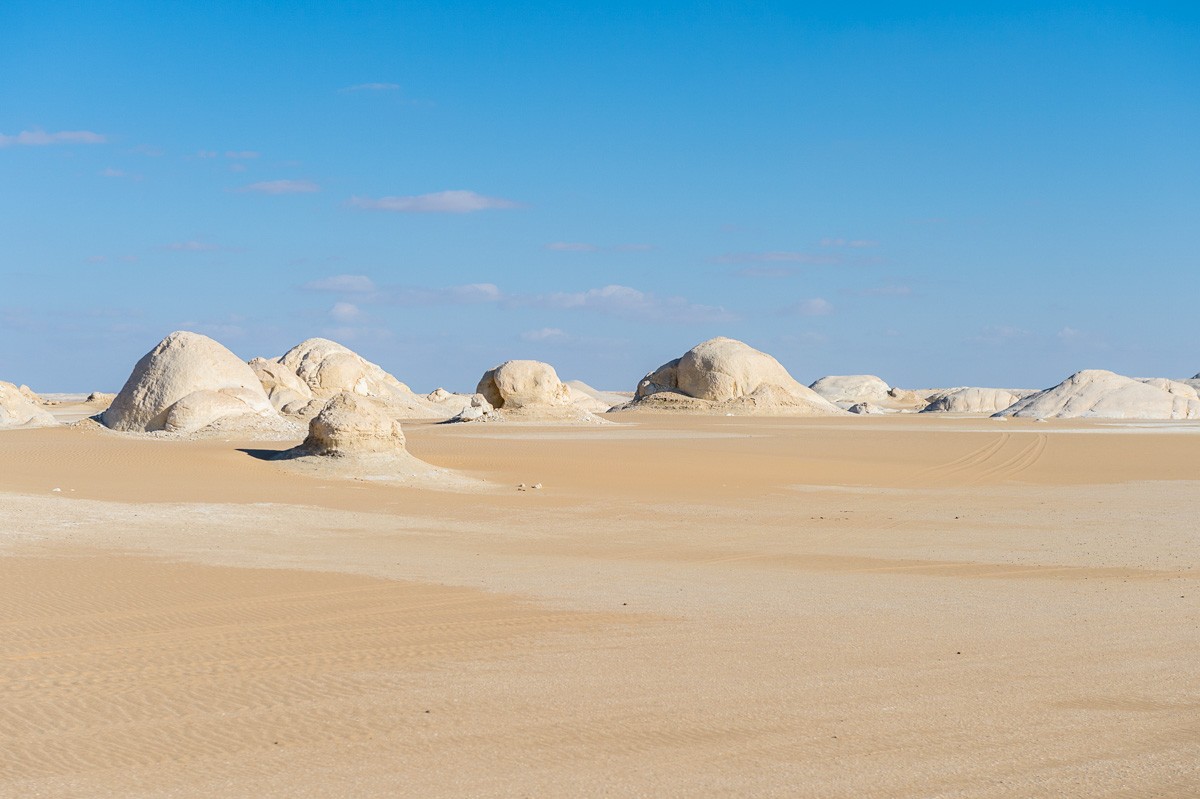
The Sahara Desert in Egypt is a landscape of extremes, where millennia-old history meets the untamed forces of nature.
The Sahara Desert is the biggest in the world, and it spans across North Africa. Over 96% (yes, you read that right!) of Egypt’s landmass is desert!
One of the best Saharan experiences is an overnight camping trip, where you can dine on traditional Bedouin meals and sleep under a sky ablaze with stars.
Or, visit the White Desert (pictured) which is known for its otherworldly chalk rocks.
Visit the lush Siwa Oasis to engage with the locals who have adapted to life in one of the harshest environments on Earth.
For adrenaline junkies, the desert’s as a playground for activities like sandboarding, dune bashing, and quad biking.
You can take Sahara Desert trips from many of Egypt’s most well-visited tourist destinations, including Hurghada and Luxor.
Nile Cruises
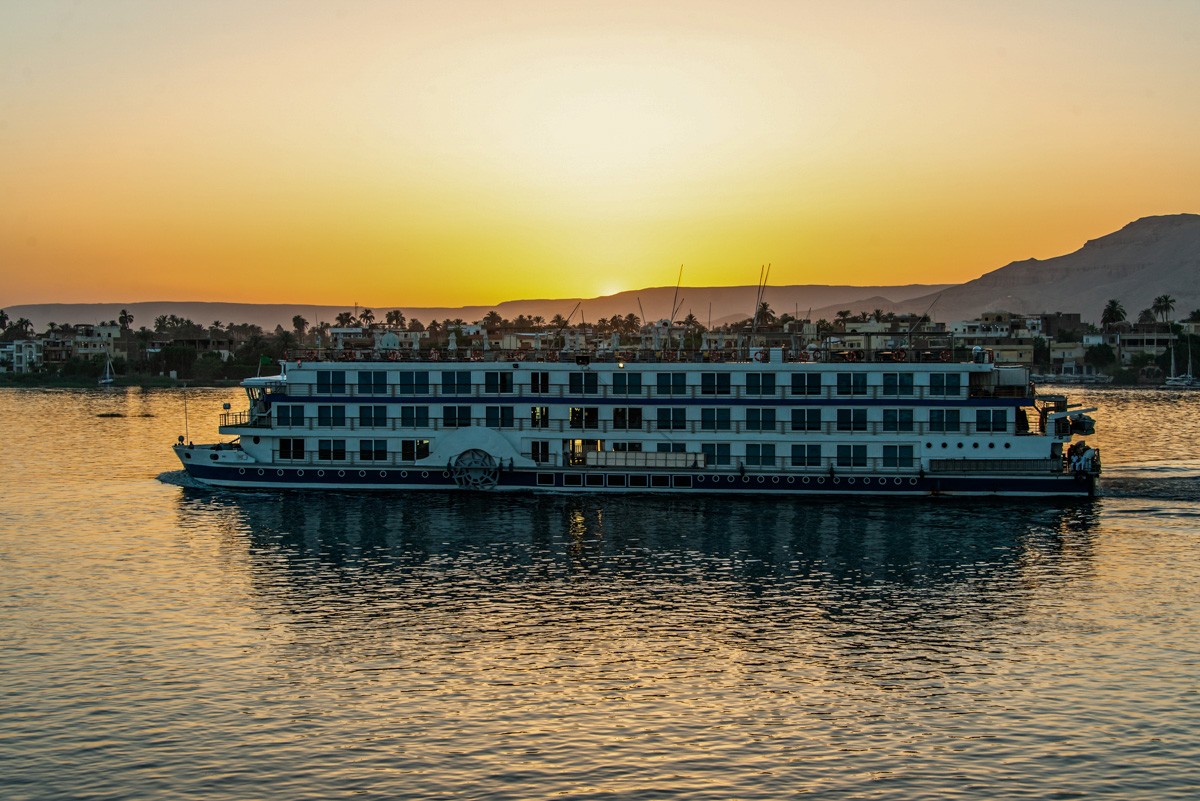
Egypt is divided by the River Nile, the longest in the world, which terminates in the North African country.
Around the Nile, the lush floodplains are home to an array of villages, built to make use of this vital water source.
Nile Cruises offer an unparalleled vantage point for experiencing the river.
The journey typically spans Luxor and Aswan, giving you easy access to iconic sites like the Valley of the Kings, Karnak Temple, and the Aswan Dam.
As you glide along the Nile, you’ll often catch glimpses of daily life unfolding on the riverbanks—children playing, farmers tending to fields, and fishermen casting their nets, just as they have for centuries.
Modern cruises provide a host of amenities, ranging from swimming pools to onboard dining options that include both local and international cuisine.
The cabins often boast panoramic windows, ensuring you don’t miss any of the surrounding scenery.
Many cruises also offer guided excursions led by expert Egyptologists, who can provide invaluable context to the ancient monuments you’re seeing.
While on the boat, you can enjoy a range of activities designed to immerse you in Egyptian culture.
These can include traditional music performances, cooking classes, and even henna tattooing.
It’s a comfortable and convenient way to traverse significant distances between historical sites, saving you the trouble of coordinating multiple modes of transport!
While it’s a fairly luxe experience, prices are often quite low for these cruises. Check some out here.
Great food
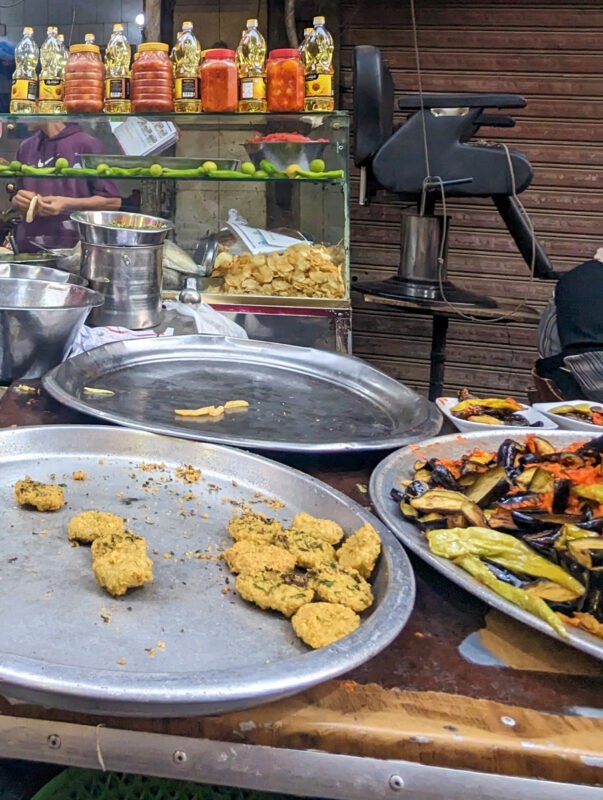
Egypt is little-known as a foodie destination – and while I struggle in a lot of countries due to being vegetarian, I actually adored Egyptian cuisine.
Fresh falafels (made with fava beans rather than chickpeas) became a staple dinner when I was there. I also loved foul, a bean stew.
One quintessential dish that you’ll find everywhere from street vendors to high-end restaurants is koshari, a satisfying mix of rice, lentils, and pasta, all topped with crispy onions and a spicy tomato sauce.
Meat dishes also feature prominently, with grilled kebabs and koftas making regular appearances at family gatherings and celebrations.
For a more regional dish, seek out molokhia, a leafy green soup with a viscous texture, traditionally made with chicken or rabbit. It’s an acquired taste for some but is deeply rooted in Egyptian home cooking.
Seafood is popular too, particularly in coastal cities like Alexandria, where you can relish freshly caught fish prepared in various styles.
If you have a sweet tooth, you won’t be disappointed. Basbousa, a semolina cake soaked in syrup and often topped with almonds, is a crowd-pleaser.
As for beverages, don’t miss out on sugarcane juice or a cup of strong Egyptian coffee.
Great value
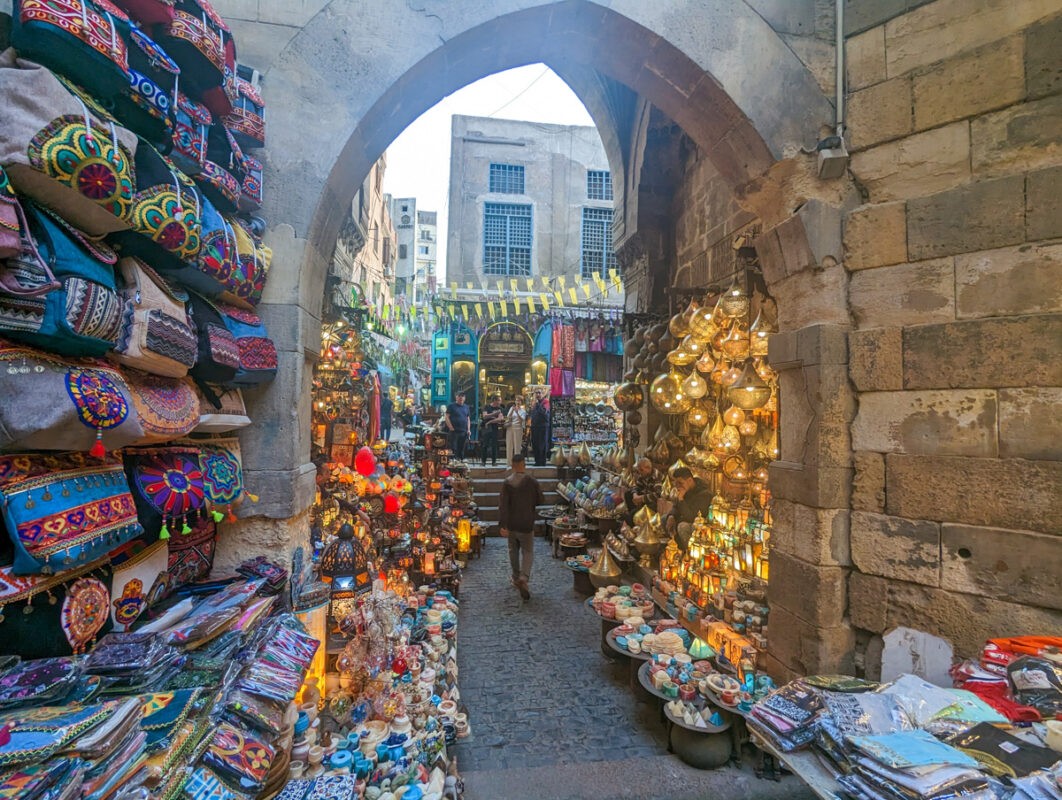
And everything – from the delicious food to accommodation – is excellent value!
Budget hotels in Cairo start from $15 per night, and you can pick up a falafel pocket for $1.
If you’re into luxury travel, five-star hotels can cost $150 per night.
We even stayed at an all-inclusive hotel in Hurghada for a week for just $350 per person (including flights).
Tours are also decently too – the aforementioned private guided trip to the Pyramids of Giza cost just $45 each!
Reasons NOT to visit Egypt
While Egypt certainly has plenty to offer in terms of tourist attractions, there are a few considerations I’d recommend bearing in mind before you visit.
Because, while I am glad I’ve visited Egypt and probably will go back at some point (just not to Cairo!), there are a few things that mean it’s not somewhere I’d be returning to time and time again (unlike say, Algeria, which I’ve just returned from and am already itching to go back to!).
A lot of hassle
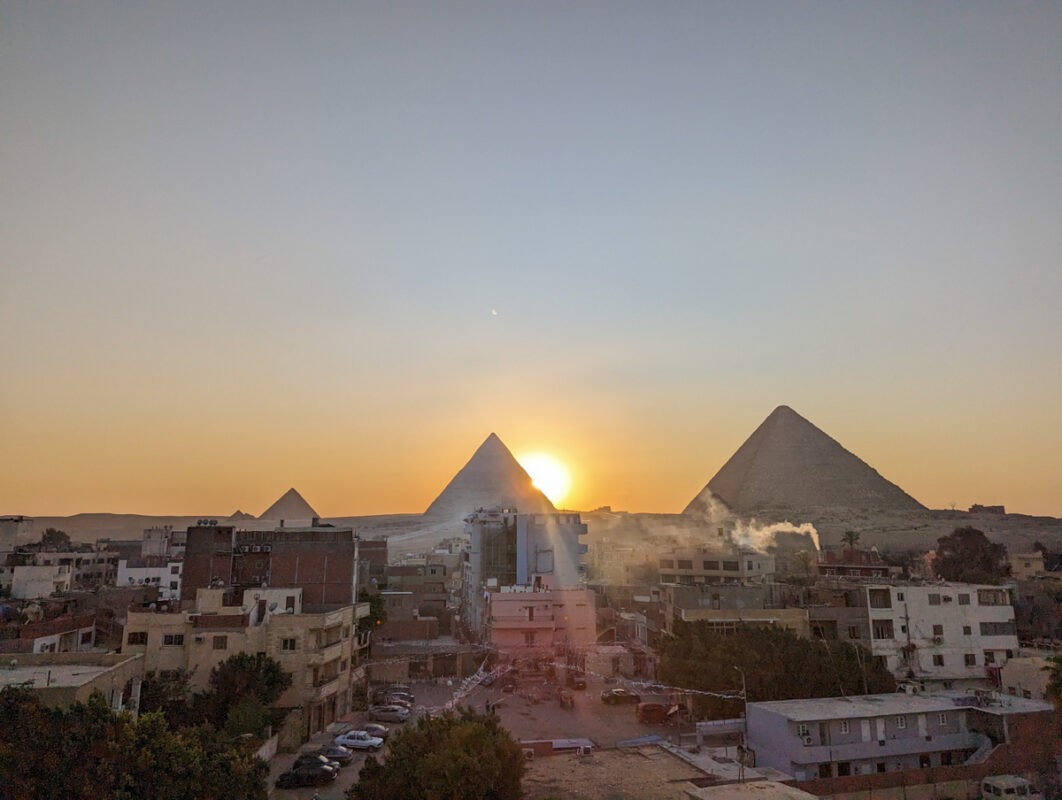
In Egypt, you do get a lot of hassle as a tourist.
Just walking around, you’ll find many people wanting to sell you items and tours.
I do understand why this is the case – Egypt’s not a rich country, and everyone’s just trying to get by. I tried to support local businesses wherever I could when I was there.
But, a couple of times, the hassle got quite overwhelming, with people constantly approaching asking us to buy things, what we were doing and where we were going.
One of the more difficult situations we had in Egypt was our hotel in Giza.
We’d booked a well-rated, budget-friendly hotel with views of the Pyramids of Giza – and initially couldn’t find it (it was in the wrong place on Google Maps!).
When we checked in, we were told our room wasn’t available and were taken to another hotel down the street, in a different-sized room without WiFi.
We had to put our foot down and insist we stay at our originally booked hotel – and a room became magically available!
These instances are very common throughout the country; you can negate them by staying in more “high-end” hotels.
I also had an issue with the man working in the hotel, which I’ll explain later on in this post!
One of the best ways you can avoid hassle in Egypt is by going on a tour. You’ll be with a guide most of the time, who will ensure that you don’t fall victim to any scams.
Alternatively, if you’re coming from Europe, then you could even consider cruising. For instance, there are family cruises from Southampton that will let you enjoy the best of the culture.
Tourist tax
Again, this is completely understandable to an extent, but sometimes it went overboard.
As a tourist in Egypt, you’ll pay more than locals for most things. And as it should be; I’d happily pay more for museums and ancient sites, for example, to make them more accessible for locals.
Likewise, paying $3 instead of $2 for some street food doesn’t bother me at all, especially if it means I’m supporting a small local business.
However, there were a few instances of locals demanding tips, or “baksheesh” as they’re known in Egypt for very minor things like a man pointing down the street to where a museum is or to a toilet attendant who I didn’t even see (she emerged from the side of the toilets and ran after me asking for a tip!).
This is part of how it is, but it can take some getting used to.
Can be uncomfortable for women
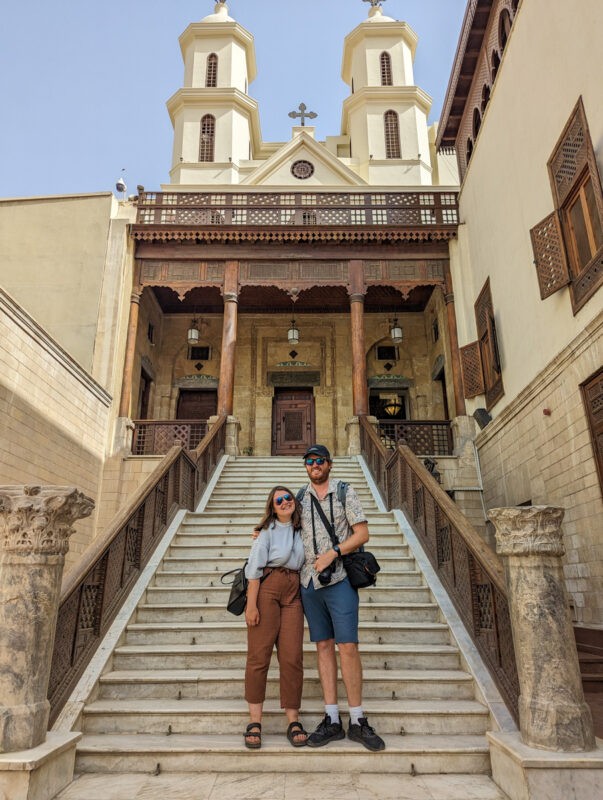
The most uncomfortable situation I had in Egypt was with the man at the aforementioned Giza hotel.
When my partner and I checked in, we headed to the rooftop to enjoy the view of the pyramids.
My partner went downstairs to get something and the man working at the hotel immediately came over to me and asked if he was my brother.
I replied, “no, he’s my partner”. The man asked “Your partner?”. To avoid confusion, I reverted to “he’s my husband”!
He then proceeded to ask me a few more uncomfortable questions about my and my partner’s personal life, standing very close to me. When my partner returned to the rooftop, he jumped away and checked with him him if he was my husband!
Luckily, my partner got the memo and agreed that we were married.
I really dislike the fact that I need to tell people I’m married to get them to stop making me feel uncomfortable, and it was this that made me think I probably wouldn’t visit Egypt as a solo female traveller.
This man working at the hotel continued to make patronising remarks to me throughout my stay. He acted like I was hysterical because I came downstairs to ask for some toilet roll and asked my partner if I was in the mafia!
Of course, I do want to stress that this encounter was just one person. 95% of Egyptian men I met were respectful.
Unfortunatley, a small percentage of men do act in the way described above and regrettably it does stick in my mind when I think about if Egypt’s worth visiting.
Cairo is overwhelming
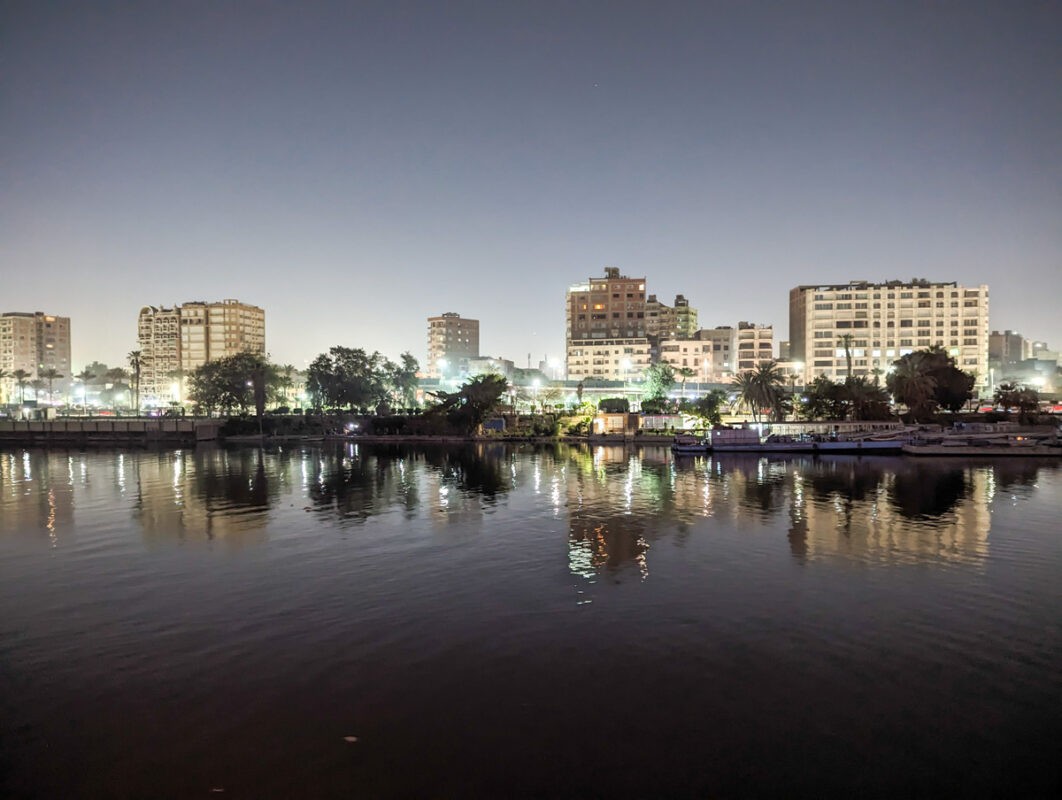
Egypt isn’t Cairo and Cairo isn’t Egypt – I’m going to write a full “is Cairo worth visiting” blog post soon as I have a lot to say about this city – but it is very much a dusty, noisy and utterly overwhelming city.
There are plenty of things to do in Cairo, from the Giza Pyramids, the Citadel, Coptic Cairo and the River Nile, but there are a few caveats to visiting too.
The sound of horns constantly permeates the air, it can take hours to travel a few kilometres in rush hour and the hassle seems more ramped up there than elsewhere in the country.
This means that it can be completely exhausting to travel around Cairo!
To mitigate this, next time I’d probably choose to stay in a comfortable, clean hotel with good facilities, to have somewhere to relax after a hectic day exploring the city.
Gastro issues can be common
Egypt’s certainly not immune to food hygiene issues, and “Pharoh’s revenge” (aka traveller’s diahorrea) can pose issues for travellers!
I’d recommend sticking to the usual mantras: drink bottled water only, avoid salads or ice cubes if you think they may have used tap water to wash or make them, ask street food vendors to cook food infront of you and be particularly careful with meat or fish.
I didn’t have any particularly bad issues during my stay, but I am quite careful these days after far too much sickness in the past!
A few security issues (but not as much as you might think)
I begrudge writing this because I do think the Middle East and North Africa get an unfair reputation for being “dangerous” due to terrorism.
However, it’s important to mention that there is the occasional terrorist attack in Egypt.
These are often targeted on the Sinai Peninsula but they occasionally do happen in Cairo. I’ve covered this a little more in my article about Cairo safety.
A few took place in 2018-19, some that did target tourists.
However, this was a few years ago now, and Egypt is constantly working on its security to encourage tourists to have a safe time in the country.
Personally, I’d be just as cautious visiting the USA or France, where shootings/ terror attacks also happen.
I do visit all these places, and deem the security risk to be about the same. Sadly, there aren’t many places that are zero risk these days (maybe Iceland?).
Also, take a look at my article about Hurghada safety for advice specifically to this beach resort (it’s one of the safest areas in Egypt).
Note: At the moment, travel to Egypt is a bit more sensitive due to its proximity to the conflict in Israel. I’d think carefully about visiting the Sinai Peninsula at the moment. I can’t comment on visiting Cairo, Alexandria, Luxor and Aswan at the time, as I’m not on the ground and don’t have the insight, but the official authorities haven’t changed their travel guidance (and they’re usually fairly quick to if they think there’s a real risk).
Who should visit Egypt?
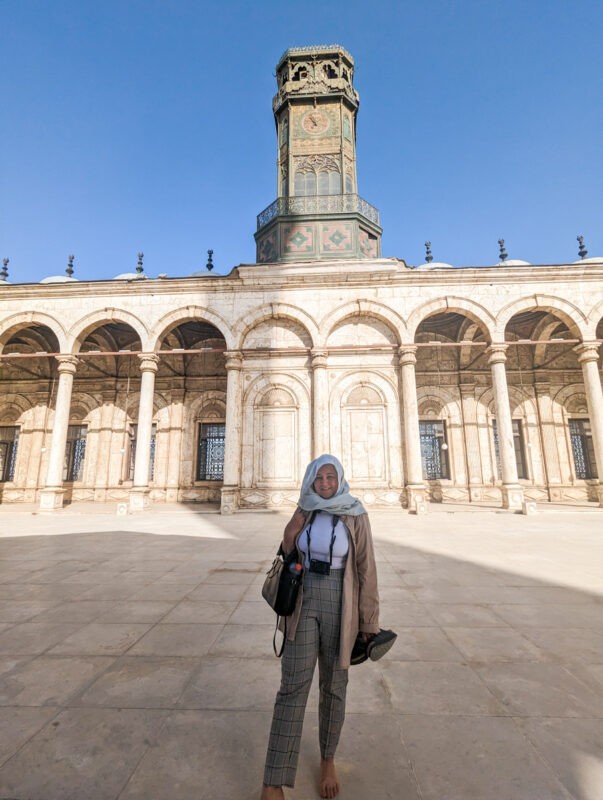
So, who’s Egypt best for?
Generally, I’d recommend more experienced travellers visit Egypt independently, largely due to the potential for hassle.
But, if you don’t feel comfortable visiting Egypt independently, there are plenty of affordable tours to embark on, too!
Anyone could visit Egypt comfortably and safely with a tour guide.
Here’s an example nine-day Egypt tour that you could consider!
Is Egypt worth visiting with kids?
Virtually every child learns about the Ancient Egyptians at some point throughout their education, and there’s nothing like seeing the pyramids in real life!
In fact, my first trip to Egypt was with my dad and sister when I was 14 and my sister was 9.
We loved seeing history come alive in Cairo, and adventurous families would love snorkelling, SCUBA and dune bashing in the desert!
Families are generally made very welcome in Egypt. I remember everyone being exceptionally friendly and happy that younger people were learning about their culture and history.
One incident in particular sticks in my mind:
We were crossing a busy road so my dad picked my sister up to carry her.
When he did so, she kicked off his bumbag which had all our passports in, plus his cash (this was a good 16 years ago). He felt it fall off, but wanted to make sure we got across the road safely, so continued walking.
A local behind us saw it fall off, picked it up and, once we’d made it to the other side of the road, located my dad to return it. He completely went out of his way to help us, which I’m not sure would happen in may cities in Europe!
Is Egypt worth visiting as a couple?
Egypt’s definitely worth visiting for adventurous couples! I probably wouldn’t pin it as a relaxing honeymoon destination, but the history, the Red Sea and the River Nile are epic for a backpacking-style adventure.
Pro tip: Book a hotel with a view of the Pyramids of Giza (not the one I stayed at – here’s another well-rated hotel) for an uber-romantic setting!
Is Egypt worth visiting as a solo traveller?
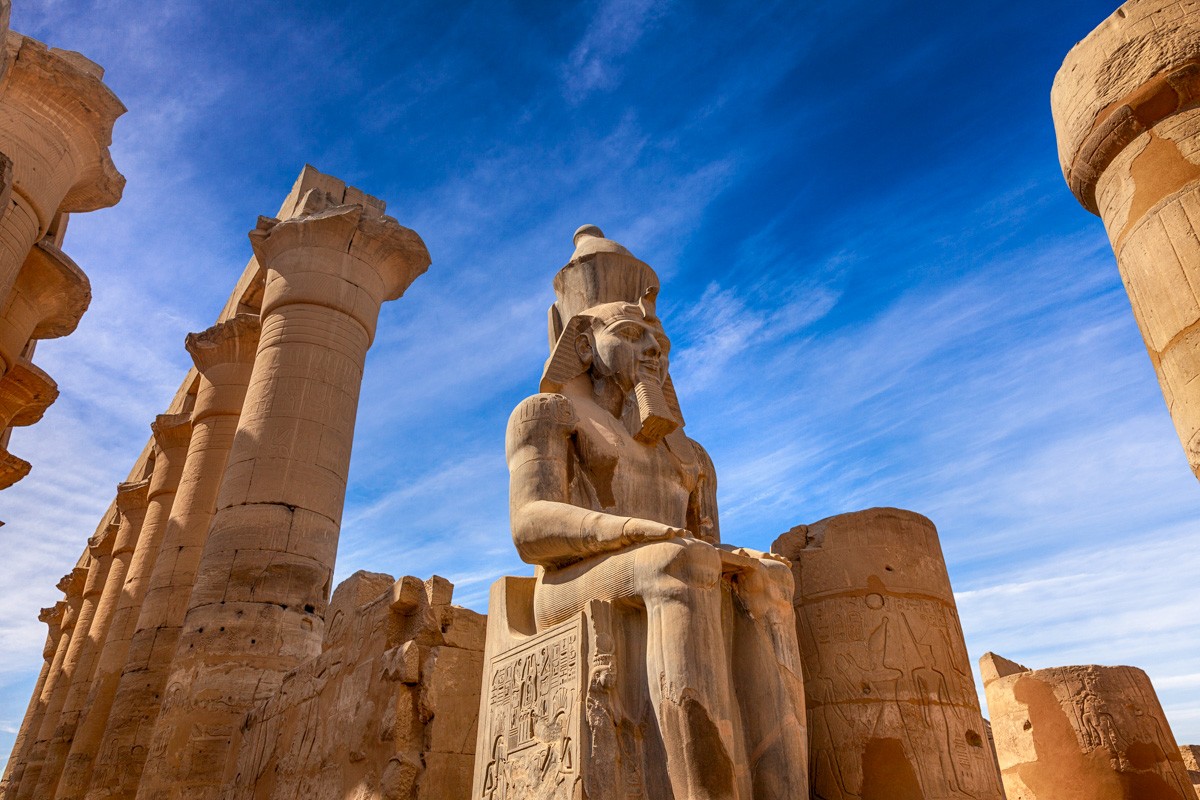
It is and it isn’t!
There are plenty of tourists in Egypt, and if you want to meet other like-minded travellers you’ll find hostels (in most places) and group tours you can join.
However, my partner and I (we both travel solo fairly frequently) both said that we liked to be able to bounce off each other at the end of the day, especially where when we’d had more overwhelming situations.
Is Egypt worth visiting as a solo female traveller?
Due to the fact that some men in Egypt can be quite over-friendly which can lead to uncomfortable situations, I personally wouldn’t visit Egypt as a solo female traveller.
This isn’t necessarily because I think it’s unsafe, but I just couldn’t be bothered with both the extra attention and not having someone to debrief when a few things happened!
So, why visit Egypt?
Visit Egypt for epic landscapes, history and great food.
The nation has a lot to offer, but there are a few things to consider, especially if you haven’t travelled much.
There are ways to mitigate this – hire a tour guide, stay in a modern hotel – and if you’re nervous about travelling to Egypt, I’d recommend doing these.
I do think Egypt is worth visiting – but be prepared, know what type of travel you want before going in and stay safe!

